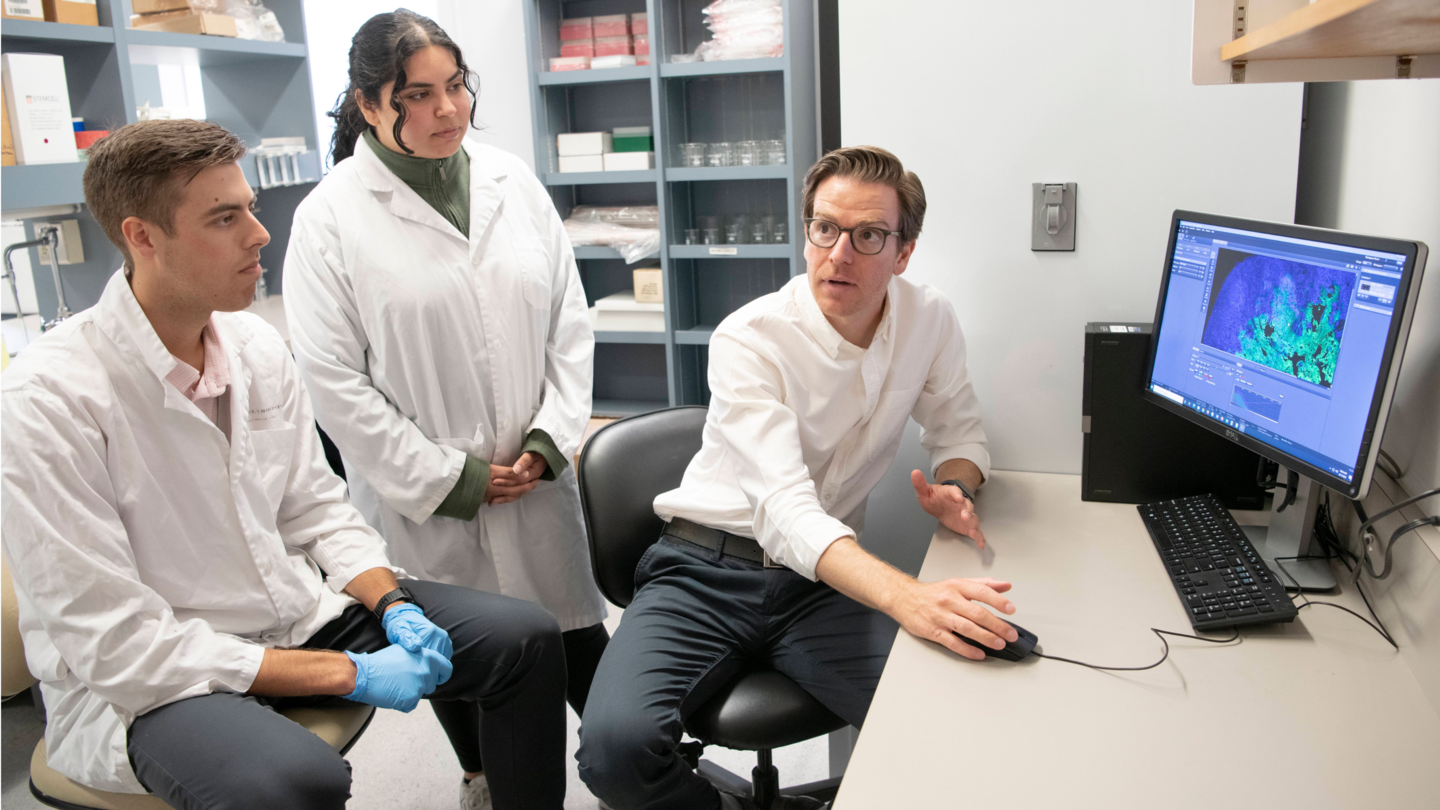Providence Research Profiles: Dr. Graeme Koelwyn
Providence Research is home to many outstanding researchers engaged in groundbreaking work. In our Providence Research Profiles series, we spotlight some of the remarkable individuals contributing to our research community. This month, we are profiling Dr. Graeme Koelwyn.
Heart Profile | Grace Jenkins

Providence Research is home to many outstanding researchers engaged in groundbreaking work. In our Providence Research Profiles series, we spotlight some of the remarkable individuals contributing to our research community. This month, we are profiling Dr. Graeme Koelwyn, a Principal Investigator with the Centre for Heart Lung Innovation (HLI) and an Assistant Professor in the Faculty of Health Sciences at Simon Fraser University (SFU). He is also the Dr. James Hogg Chair and Tier 2 Canada Research Chair in Public Health ‘Omics in Exercise and Disease at St. Paul’s Hospital. He runs the Koelwyn Lab, a translational research program that studies the association between exercise and disease outcomes, particularly regarding how exercise influences the immune system and inflammation.
Dr. Koelwyn’s research focuses on using exercise physiology to improve outcomes in patients with certain diseases with precisely timed and dosed exercise interventions.
Kinesiology, speed skating led to research career
Dr. Koelwyn’s undergraduate students at SFU often ask him why he decided to pursue a career in research.
“I don’t think I ever saw myself as a researcher, particularly when I was at their stage, in undergrad,” says Dr. Koelwyn. His undergraduate degree was in Kinesiology at the University of Calgary. At that time, he was also a speed skater, training in the National High-Performance Program at the Olympic Oval, located within the Kinesiology department, and he was interested in learning how athletic performance could be improved through the science of exercise.
Research was not on his radar until a professor involved him in some research projects near the end of his degree, which he found very engaging.
“It was the pursuit of interesting questions, and being in a position where you can actively explore your own curiosity and find answers to questions that could help others,” says Dr. Koelwyn. These initial projects opened more opportunities, and it was exciting to combine his interest in exercise physiology with medicine. “Now, my research program is really focused on how we can use exercise as a treatment to improve the underlying biology of different diseases, which translates into benefits for patients.”
Studying how exercise can improve patient outcomes
Before Dr. Koelwyn began his role at the HLI in 2021, he completed his PhD in Pathobiology and Translational Medicine at the NYU Grossman School of Medicine, followed by a Postdoctoral Fellowship at Memorial Sloan Kettering Cancer Center in New York City. Much of his research in New York focused on understanding the impact of exercise on the initiation and progression of cancer at a cellular level, as well as on tumor biology. Not only do more physically active people have a lower risk of certain types of cancer, but those who exercise after receiving a cancer diagnosis have a lower risk of their disease progressing. Dr. Koelwyn found that exercise regulates the immune system, helping it react to cancer cells in a way that slows disease progression.

Dr. Koelwyn and students conduct research at the Koelwyn Lab. From left to right: Geoffrey Nonis, Anmol Malhi, Dr. Graeme Koelwyn
At the HLI, he applies what he learned about cancer to diseases that similarly dysregulate the immune system, like sepsis, heart disease and lung disease. Inflammation is a connecting thread between these diseases. Dr. Koelwyn is investigating if specific exercise interventions can help normalize immune function and inflammation to improve disease outcomes in these patients.
For example, exercise, is generally beneficial for patients living with heart disease, but the biological mechanisms behind these benefits are not fully known.
“We know that [exercise] improves quality of life and reduces cardiac events, but we don’t fully know how it’s doing that,” says Dr. Koelwyn. He is working with collaborators in the Healthy Heart Program and Cardiac Rehabilitation at St. Paul’s Hospital to better understand how exercise influences the immune system and inflammation, which is a known driver of heart disease progression.
Another current project involves patients who develop sepsis, a dysregulated immune response to an infection, while in the Intensive Care Unit at St. Paul’s Hospital. Survivors of sepsis face continuing challenges, including a high risk for subsequent cardiovascular events, such as a heart attack, in the years following their time in the hospital, as well as recurrent infections. Dr. Koelwyn is investigating how appropriately ‘dosed’ exercise might be able to reorient the immune system, decrease inflammation in sepsis survivors, and reduce the risk for these subsequent events.
Collaborating to solve complex problems
Throughout his journey, Dr. Koelwyn has been fortunate to have had people who supported him.
“I’m only in the position I am in because I've had incredible support from my family throughout this entire journey, as well as mentors and colleagues who have provided me with opportunities to learn and train in supportive and exciting research environments,” says Dr. Koelwyn.
Now that he has his own lab, he makes an effort to create mentorship opportunities, to enable people to explore their passions, and to help student trainees take the next steps in their careers.
One of Dr. Koelwyn’s favorite aspects of the research process is bringing together a team of interdisciplinary clinicians, researchers, and students to collaborate to explore research questions that could not be answered alone. He enjoys working with individuals from diverse backgrounds and areas of expertise to solve complex problems that have the potential to help many people.
Dr. Koelwyn is an inherently curious person, and being able to align his curiosity with the pursuit of research questions that have the chance to improve the lives of patients, who don’t currently have many options to treat their conditions, motivates him in his research.
“I think like many of us, I’ve always wanted to have a career where I love what I do, and that what I do may one day also help others.” says Dr. Koelwyn.